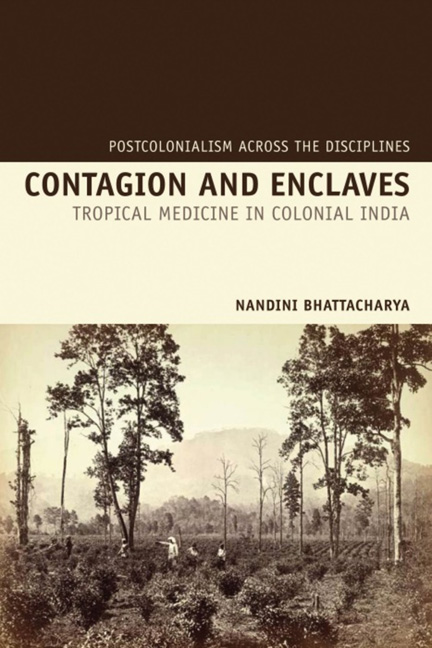Book contents
- Frontmatter
- Dedication
- Contents
- List of Illustrations
- List of Tables
- Acknowledgements
- List of Abbreviations
- 1 Disease and Colonial Enclaves
- 2 The Sanatorium of Darjeeling: European Health in a Tropical Enclave
- 3 Pioneering Years in Plantation and Medicine in Darjeeling, Terai and Duars
- 4 The Sanatorium Enclave: Climate and Class in Colonial Darjeeling
- 5 Contending Visions of Health Care in the Plantation Enclaves
- 6 The Plantation Enclave, the Colonial State and Labour Health Care
- 7 Tropical Medicine in Its ‘Field’: Malaria, Hookworm and the Rhetoric of the ‘Local’
- 8 Habitation and Health in Colonial Enclaves: The Hill-station and the Tea Plantations
- Bibliography
- Index
7 - Tropical Medicine in Its ‘Field’: Malaria, Hookworm and the Rhetoric of the ‘Local’
- Frontmatter
- Dedication
- Contents
- List of Illustrations
- List of Tables
- Acknowledgements
- List of Abbreviations
- 1 Disease and Colonial Enclaves
- 2 The Sanatorium of Darjeeling: European Health in a Tropical Enclave
- 3 Pioneering Years in Plantation and Medicine in Darjeeling, Terai and Duars
- 4 The Sanatorium Enclave: Climate and Class in Colonial Darjeeling
- 5 Contending Visions of Health Care in the Plantation Enclaves
- 6 The Plantation Enclave, the Colonial State and Labour Health Care
- 7 Tropical Medicine in Its ‘Field’: Malaria, Hookworm and the Rhetoric of the ‘Local’
- 8 Habitation and Health in Colonial Enclaves: The Hill-station and the Tea Plantations
- Bibliography
- Index
Summary
This chapter studies the dynamics between colonial enclaves and Tropical Medicine in the twentieth century. Despite the acceptance of germ theory, British Indian medical discourse and practice never abandoned miasmatic and climatic theories of disease. In colonial India, Tropical Medicine continued to connect diseases with specific ‘zones’ and ‘localities’. Research in Tropical Medicine reiterated the importance of ‘local factors’ constructed through ecological, climatic or cultural modes. From their contribution to Tropical Medicine, through the ‘experiments’ and verification of disease theories in their localities, to the contribution to the control of archetypical ‘tropical’ disease in Bengal and India generally, the tea plantations were an important site for the exploration of new ideas and experimentation. In the case of research in antimalarial sanitation, a focus on the local ecological conditions of the tea plantations in Darjeeling foothills merged seamlessly with factors such as the cultural behaviour of plantation labourers – all framed in a set of conditions termed the ‘local’. Simultaneously the political economy of the tea plantations inhibited both anti-malarial sanitation as well as systematic and full use of quinine prophylaxis within these ‘local’ sites. Similarly, when the Indian Research Fund Association (IRFA) proposed a hookworm project to assess the feasibility of its eradication, the medical experts chose the Darjeeling hill plantations as their first, experimental site. The results of the hookworm survey showed a very high incidence among the plantation labourers. The planters, while providing the plantation space for the surveys, were not persuaded to install sanitary facilities for the workers, nor did the government initiate legislation to facilitate it. Therefore, following the survey in Darjeeling and subsequent ones in Duars and Terai, the problem of hookworm eradication in the plantations remained unresolved.
This chapter argues that Tropical Medicine was enriched by studies in colonial enclaves which facilitated wide-ranging studies on preventive and therapeutic aspects of the internationally competitive specialism. These studies validated the value or significance of ‘local factors’ in epidemiology as they did in governance itself. There were no structural therapeutic or public health benefits to the enclaves in the process.
- Type
- Chapter
- Information
- Contagion and EnclavesTropical Medicine in Colonial India, pp. 149 - 183Publisher: Liverpool University PressPrint publication year: 2012



